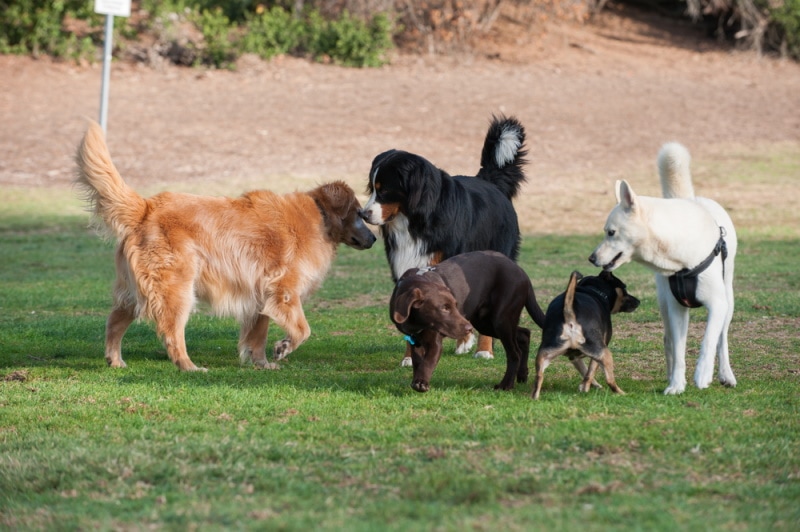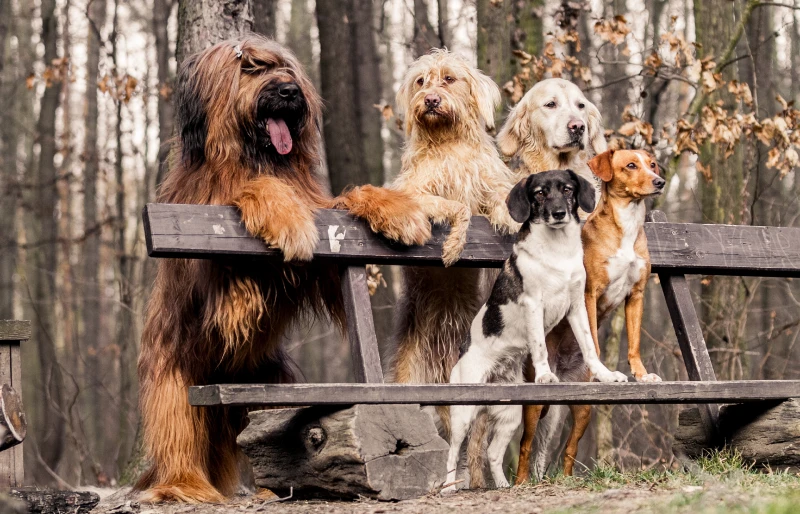In this article
Dogs are social animals that thrive in the company of other dogs as well as humans. They are known for their loyalty and companionship, which is why they make excellent pets for individuals and families alike.
In fact, dogs are known as highly social animals, with many species of canids living in packs in the wild. This pack mentality has been ingrained in dogs for thousands of years, and it is still evident in their behavior today.

Do Dogs Like to Socialize With Other Dogs?
One of the most important aspects of a dog’s social nature is their ability to interact with other dogs. Dogs are highly attuned to social cues, and they use body language, vocalizations, and scents (pheromones) to communicate with each other.
They also have a strong sense of hierarchy, with dominant dogs taking charge and submissive dogs following their lead. In a group of dogs, there is always a complex social structure at play, and each dog has their place within the pack.
But do dogs actually enjoy being around other dogs? The answer to this question is a resounding yes! Dogs are social animals, and they thrive on interaction with both humans and other dogs.
Socialization is a critical component of a dog’s development, and it is important for their mental and emotional well-being. When dogs are properly socialized, they learn how to interact with others in a healthy and positive way, which can prevent aggression and other behavioral issues down the road.

Are Dogs Happier With Other Dogs Around?
Studies have shown that dogs experience a surge of feel-good hormones when they are in the presence of other dogs. This is likely due to the fact that social interaction triggers the release of oxytocin, a hormone that is associated with feelings of bonding and affection.
When dogs play and interact with each other, they are strengthening their social bonds and building trust and cooperation within their pack!
Of course, it is important to note that not all dogs are the same, and some may have individual preferences when it comes to social interaction. Some dogs may be more introverted and prefer to spend time alone, while others may be more extroverted and thrive on social interaction. It is up to pet owners to observe their dog’s behavior and personality and tailor their socialization efforts accordingly.
It is best to discuss concerns about your dog’s socialization skills (or lack thereof) with a dog trainer or a veterinarian.
If you need to speak with a vet but can't get to one, head over to PangoVet. It's our online service where you can talk to a vet online and get the advice you need for your pet — all at an affordable price!


How Do I Know If My Dog Needs Another Dog?
Determining whether your dog needs another dog is a complex question that ultimately depends on your dog’s individual personality, needs, and lifestyle. While some dogs thrive on social interaction and enjoy the company of other dogs, others may be perfectly content living as the sole pet in a household.
When you’re thinking about bringing a new dog into your home, it’s important to consider the following factors:
1. Temperament
If your dog is outgoing and enjoys playing with other dogs, it might be a good idea to get another furry friend for them. On the other hand, if your dog is more reserved or timid, or has aggression issues, they may prefer to be the only pet in your home.

2. Age and Energy Level
Younger dogs with high energy levels may benefit from having another dog to play and run around with. In contrast, senior dogs might favor a less active way of life and might lack the stamina to match a younger dog’s energy level.
3. Breed
Dogs may have different social preferences depending on their breed. To provide proper care, it is important to study and understand your dog’s breed, including their typical temperament and social needs.
4. Lifestyle and Availability
Introducing another dog into your household requires time, attention, and resources. If you work long hours or travel frequently, it may be challenging to give two dogs the attention they need.

5. Living Situation
If you live in a small apartment or have limited outdoor space, adding another dog to the household may not be practical. In addition, it is worth noting that not all dog breeds are apartment-friendly.

Conclusion
It’s important for dogs to socialize with both humans and other dogs since they are naturally social creatures. Proper socialization can promote their well-being and prevent potential behavioral problems in the future.
Owners can ensure the happiness, health, and positive adjustment of their furry companions by offering them opportunities to interact with others in a healthy and friendly manner.
Before bringing a new dog into your home, it’s crucial to take your current dog’s unique needs and personality into account. If you do choose to adopt a new dog, it’s important to introduce them properly and supervise their interactions to ensure everyone is safe and comfortable.
See also:
- Do Dogs Have a Hierarchy? Vet-Verified Social Structures Explained
- Are Dogs Pack Animals? Our Vet Explains the Social Structure of Dogs
Featured Image Credit: Aneta Jungerova, Shutterstock























